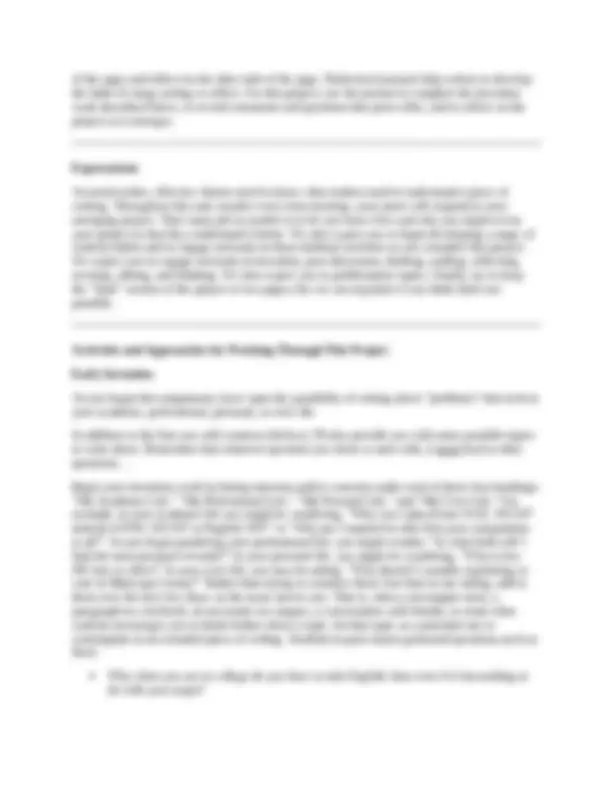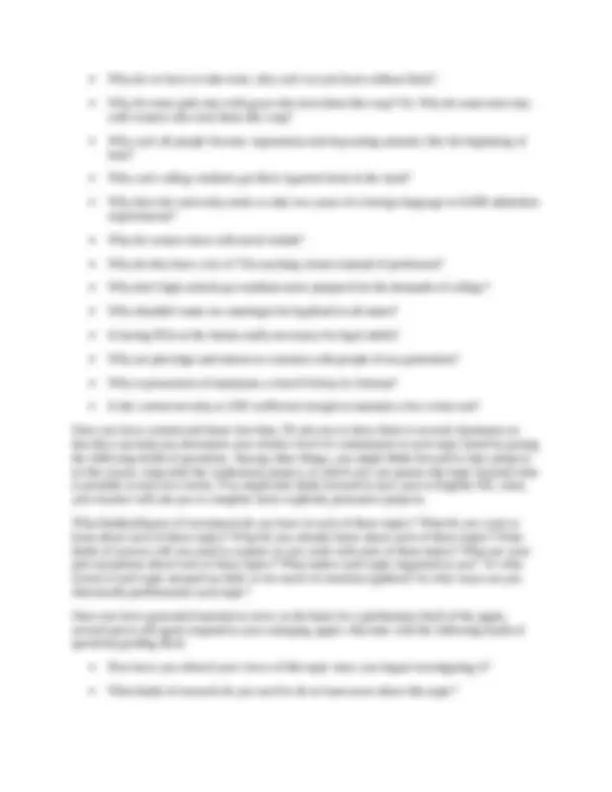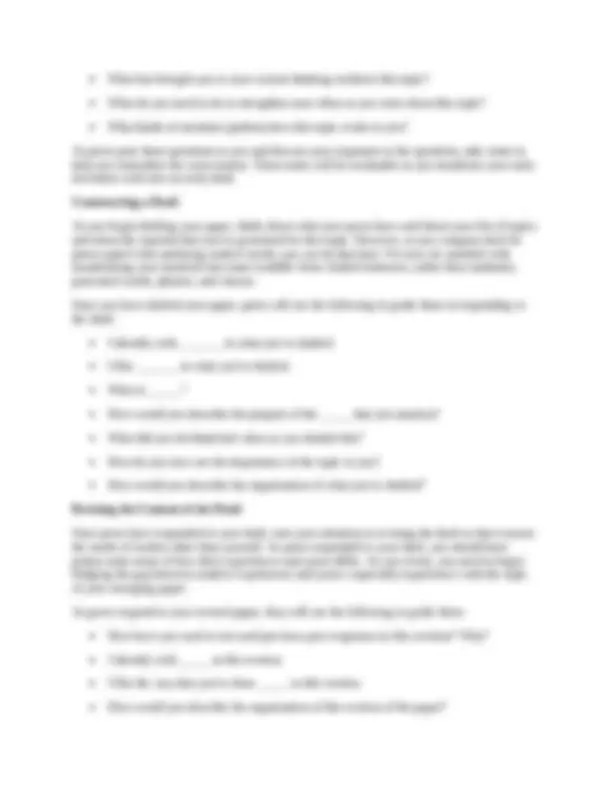





Study with the several resources on Docsity

Earn points by helping other students or get them with a premium plan


Prepare for your exams
Study with the several resources on Docsity

Earn points to download
Earn points by helping other students or get them with a premium plan
Community
Ask the community for help and clear up your study doubts
Discover the best universities in your country according to Docsity users
Free resources
Download our free guides on studying techniques, anxiety management strategies, and thesis advice from Docsity tutors
The instructions for the first writing project in the asu wac 101 course for the fall 1999 semester. Students are asked to pose a question about a topic that interests them and explore it through various lenses: academic, professional, personal, and civic. The goal is to generate more questions and delve deeper into the topic, rather than providing answers. The project also emphasizes rhetorical considerations, invention, peer discussions, drafting, revising, editing, and reflection.
Typology: Study Guides, Projects, Research
1 / 6

This page cannot be seen from the preview
Don't miss anything!




The Writing Project Write/construct a short paper in which you pose a question about some topic that currently interests you. The ideal is to consider topics that you've contemplated since arriving at ASU. Also, consider topics in all four of your worlds--academic, professional, personal, civic. (Keep in mind that your academic life may last only four more years; your other lives will continue for many decades.) You do not answer the question in this writing project (as you may be used to doing) but rather use the question as a starting point to lead to more questions, perhaps about the larger issues involved. In addition to posing a question, you need to accomplish several other tasks in this short paper. First, help readers--in this case, your classmates--understand why this question interests you. Second, help classmates understand what makes the question problematic or not easily answered (see page 19). Third, help classmates see why this question is significant --worth contemplating, worth trying to answer (see page 20). Please note that the idea is to simply ask questions, questions that lead to other questions... and when you do come to some answers, those answers should lead to still more questions. Remember that you do not want to find the answer... only to keep asking questions and try to see what other issues and problems and concerns arise. Rationale for This Project I'm asking you to do many tasks in this first project in the course. I hope that some of these tasks are familiar to you, but I also hope that some of them are novel enough to encourage you to think in new ways. First, the project asks you to think in rhetorical ways--to think about how your emerging text shapes and is shaped by your relationships with your readers. Second, the project requires you to think about all four worlds in which humans exist: academic, professional, personal, and civic worlds. Third, the project sets the stage for the rest of this course and for subsequent writing courses by asking you to engage in the process of composing. In particular, to complete
this project successfully, you will need to draft and edit--as you have done in the past. Beyond those activities, though, the work of this project and subsequent ones requires you to do more invention and more revision than you may have done in the past. Fourth, use this project to begin thinking about topics for projects throughout this semester and next. I'd love to see you dig your teeth into the same topic area for all papers in English 101 and 102, but you may decide to contemplate a wider range of topic area. Fifth, throughout this project, as well as all the other projects in the course, I will ask you to reflect on your work--your invention, your discussions with peers, your drafting, your revising, your editing, your thinking, your reading. Both partway through the course and at the end of the course, you will submit a reflective letter on all of the work you've done through the semester. Even though they aren't due for many weeks, you begin constructing those portfolios today. Rhetorical Considerations Over the past 2500 years, many scholars have offered definitions of the term "rhetoric." For this project, consider three definitions of the term: Aristotle: "the faculty of observing in any given case the available means of persuasion" ( Rhetoric I, ii, 26-27). John Genung: "the art of adapting discourse, in harmony with its subject and occasion, to the requirements of a reader or hearer" ( The Practical Elements of Rhetoric. Boston: Ginn, 1886, 1). I.A. Richards: "a study of misunderstanding and its remedies" ( The Philosophy of Rhetoric. New York: Oxford UP, 1936, 3) These definitions, offered by three well-known rhetoricians, point to some of the factors that writers need to consider to be rhetorically effective. First, all three note that writers need to bridge any gaps that exist between readers and themselves. In this project and in subsequent ones in this course and in the next course, we'll ask that you spend lots of time discussing your projects as they develop. Through this ongoing dialogue, you will learn more about what your readers need and want if they are to understand what's on your mind. The first two definitions of "rhetoric" also suggest that there are diverse settings and purposes for writing, each presenting writers with different demands. Using Your Journal for This Project Your journal for the course will have two kinds of content and purpose. First, use the journal for invention work--for generating material for your projects. I'll also share with you other kinds of informal writing that will help generate material. Second, use the journal as place to reflect on your work in the course--invention, peer discussions, drafting, reading, revising, editing, thinking. You might consider a dialectical journal in which you record and generate on one side
Why do we have to take tests, why can't we just learn without them? Why do some girls stay with guys who treat them like crap? Or, Why do some men stay with women who treat them like crap? Why can't all people become vegetarians and stop eating animals, like the beginning of time? Why can't college students get their cigarette butts in the trash? Why does the university make us take two years of a foreign language to fulfill admission requirements? Why do women mess with mens' minds? Why do they have a lot of TAs teaching classes instead of professors? Why don't high schools get students more prepared for the demands of college? Why shouldn't same sex marriages be legalized in all states? Is having RAs in the dorms really necessary for legal adults? Why are piercings and tattoos so common with people of my generation? Why is possession of marijuana a class 6 felony in Arizona? Is the current security at ASU sufficient enough to maintain a low crime rate? Once you have constructed those four lists, I'll ask you to show them to several classmates so that they can help you determine your relative level of commitment to each topic listed by posing the following kinds of questions. Among other things, you might think forward to later projects in this course, especially the exploratory project, in which you can pursue this topic beyond what is possible in next few weeks. You might also think forward to next year in English 102, when your teacher will ask you to complete more explicitly persuasive projects. What kind(s)/degree of investment do you have in each of these topics? What do you want to learn about each of these topics? What do you already know about each of these topics? What kinds of sources will you need to explore as you work with each of these topics? What are your preconceptions about each of these topics? What makes each topic important to you? To what extent is each topic steeped too little or too much in emotions (pathos)? In what ways can you rhetorically problematize each topic? Once you have generated material to serve as the basis for a preliminary draft of the paper, several peers will again respond to your emerging paper--this time with the following kinds of questions guiding them: How have you altered your views of this topic since you began investigating it? What kinds of research do you need to do to learn more about this topic?
What has brought you to your current thinking on/about this topic? What do you need to do to strengthen your ethos as you write about this topic? What kinds of emotions (pathos) does this topic evoke in you? As peers pose these questions to you and discuss your responses to the questions, take notes to help you remember the conversation. These notes will be invaluable as you transform your early invention work into an early draft. Constructing a Draft As you begin drafting your paper, think about what your peers have said about your list of topics and about the material that you've generated for this topic. However, as you compose don't be preoccupied with satisfying readers' needs; you can do that later. For now, be satisfied with transforming your material into some readable form--linked sentences, rather than randomly generated words, phrases, and clauses. Once you have drafted your paper, peers will use the following to guide them in responding to the draft: I identify with _______ in what you've drafted. I like _______ in what you've drafted. What is _____? How would you describe the purpose of the _____ that you mention? What did you do/think/feel when as you drafted this? How do you now see the importance of the topic to you? How would you describe the organization of what you've drafted? Revising the Content of the Draft Once peers have responded to your draft, turn your attention to revising the draft so that it meets the needs of readers other than yourself. As peers responded to your draft, you should have gotten some sense of how their experiences and yours differ. As you revise, you need to begin bridging the gap between readers' experiences and yours--especially experiences with the topic of your emerging paper. As peers respond to your revised paper, they will use the following to guide them: How have you used or not used previous peer responses in this revision? Why? I identify with _____ in this version. I like the way that you've done _____ in this version. How would you describe the organization of this version of the paper?